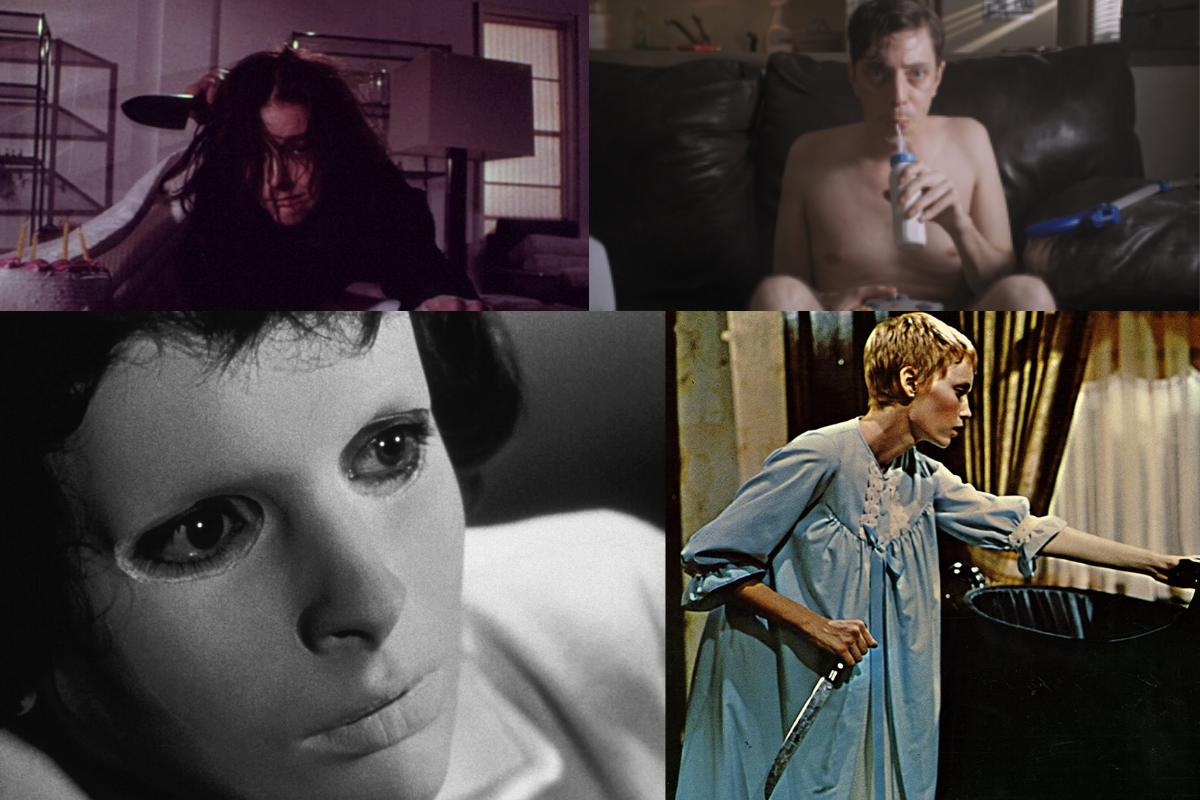Isolation and Madness take center stage in the third installment of Logan Ann Taylor’s at-home film festival
Entering Week 3 of the Shut-in Film Festival, I’m sure we’re all getting a little cagey. So far we’ve seen temporary forms of isolation and more permanent forms of isolation that can nonetheless be adapted to, escaped from or changed. This week, we deal with the deepest forms of permanent change: when isolation leads to insanity, hallucinations and/or identity confusion. It may not be the most uplifting week in the series, but I hope it points out an important area of our lives that requires attention. We need to consider our mental health these days. Depression, anxiety, confusion and existential crises are all to be expected right now, but if any of these feelings becomes unbearable or distracting, please seek support from friends, family or professional help; However, if you are feeling relatively OK and finding some stability in the chaos, then stretch your brain and enjoy a few films where isolation leads to complex, thought-provoking psychological shifts.
Day One: Bonding Through Nurturing
Persona (Ingmar Bergman, 1966) or Sisters (Brian De Palma (1972)
We’re starting off with a couple classic cases of identity confusion. Though Igmar Bergman’s Persona and Brian De Palma’s Sisters have different approaches to their material, they share a thematic commonality. Both films concern a traditional feminine activity — that of caretaking and nurturing — that eventually create tension and resentment between the caretaker and her patient. Each film’s lead character is an aid to a mentally unwell woman of a similar age. In Persona, a nurse is tasked with caring for a famous actress who has suffered an emotional breakdown. In Sisters, Danielle cares for her conjoined twin sister from whom she’s been physically separated. As the women in these films spend more time with each other in confined spaces, the lines separating the well from the unwell, the sane from the insane, start to blur. If you’re feeling ambitious today, these would make for a clever double feature of gorgeously acted, highly expressionist works of master filmmakers.
Persona and Sisters are both available on Kanopy
Day Two: Admiration and Envy
3 Women (Robert Altman, 1977) or Clouds of Sils Maria (Olivier Assayas, 2015)
This happens to be one of my favorite subgenre of thrillers: films where one woman envies another so much she starts to subvert her, imitate her, replace her or in some cases entirely become her. There are many classics of this theme worth exploring — All About Eve, Single White Female, etc. — but these two are favorites because of their ambiguity. It’s easy enough to just let jealousy be a driving force for one malevolent character to take over another’s life, but these films explore subtler psychological forces. In 3 Women, Altman’s pastel-soaked dreamscape-turned-nightmare, Millie takes colleague Pinky under her wing, letting Pinky slowly infiltrate her life until the two women (and a third mysterious side character, hence the title) no longer maintain distinct personalities. Clouds of Sils Maria examines the uncomfortable dynamics between famous actress Maria Enders and her assistant, played masterfully by Juliette Binoche and Kristen Stewart respectively. I won’t ruin the endings of either film, but rest assured you’re in for something mystifying and unforgettable.
Three Women and Clouds of Sils Maria are both available to rent on Amazon Prime
Day Three: Self-Inflicted Isolation
Relaxer (Joel Potrykus, 2018)
Now for something completely different! The feminine wiles of the first two films stand in sharp contrast to this irreverent, hallucinatory gross-out comedy. Relaxer is Joel Potrykus at his most pure: a stripped-down chamber piece that, despite its simple setting, manages to be a rollercoaster ride of insanity, obsession and physical disintegration. Relaxer stars Potrykus regular Joshua Burge as Abbie, a loner preparing for the Y2K apocalypse whose brother challenges him to beat Pac Man’s 256 levels in one sitting — literally without leaving his couch. As anyone with siblings can attest, when you’re dared to stay put, you have to win. What follows is a physical odyssey that requires a strong stomach to sit through. It also serves as a friendly reminder to all of us at home to get up off the couch every once in a while… or else.
Read Bennett Glace’s interview with Joel Potrykus and his exploration of Potrykus’ Midwestern Monsters
Relaxer is available to rent on Amazon Prime
Day Four: Isolation in shared spaces
The Apartment Trilogy:
Repulsion (Roman Polanski, 1965)
The Tenant (Polanski, 1976)
Rosemary’s Baby (Polanski, 1968)
The Polanski-averse side of me wanted to skip these, but they are unavoidably essential films for any exploration of madness in confined spaces. The Apartment Trilogy remains unrivaled in its use of space as both a source of and outward manifestation of insanity. All three films craft hallways and rooms that defy logic — spaces that are claustrophobic and menacing and imbued with anthropomorphic evil. You truly can’t go wrong watching any of these, but I find The Tenant, his most unsung entry, to be the most compelling in terms of identity confusion. Some of its implications may not have aged well, but the shifts in our protagonist’s understanding of self is mirrored artfully in the way the space itself changes, and that alone makes it a film worth dissection and appreciation.
Repulsion is available to rent on Amazon Prime
The Tenant is available to rent on YouTube or stream on Hulu
Rosemary’s Baby is available on Netflix
Day Five: Isolation for Self-Improvement
Eyes Without a Face (Georges Franju, 1960)
It’s been refreshing to see Georges Franju’s macabre thriller earn more attention in recent years on top horror film lists. I can’t explain the sudden uptick in awareness of this classic, but I will say its themes have never felt more haunting or timely. When Dr. Génessier (Pierre Brasseur) disfigures his daughter Christiane (Edith Scob) in a car accident, he hides her away in his mansion in an eery, expressionless white mask to cover her scarred face. The doctor and his assistant kidnap young women and try to transplant their faces onto Christiane’s. It’s quite a wild premise by the era’s standards (legend has it that seven people fainted at the film’s premiere in Edinburgh), featuring unforgettable imagery (a Franju specialty) and an elegant, creepy lead performance in which her identity change comes about in the most physical and startling of ways.
Read Jodi Please’s October Horror essay on Eyes Without a Face
Eyes Without a Face is available to stream on The Criterion Channel or rent on Amazon Prime
Follow Split Tooth Media on Twitter and Letterboxd
(Split Tooth may earn a commission from purchases made through affiliate links on our site.)




